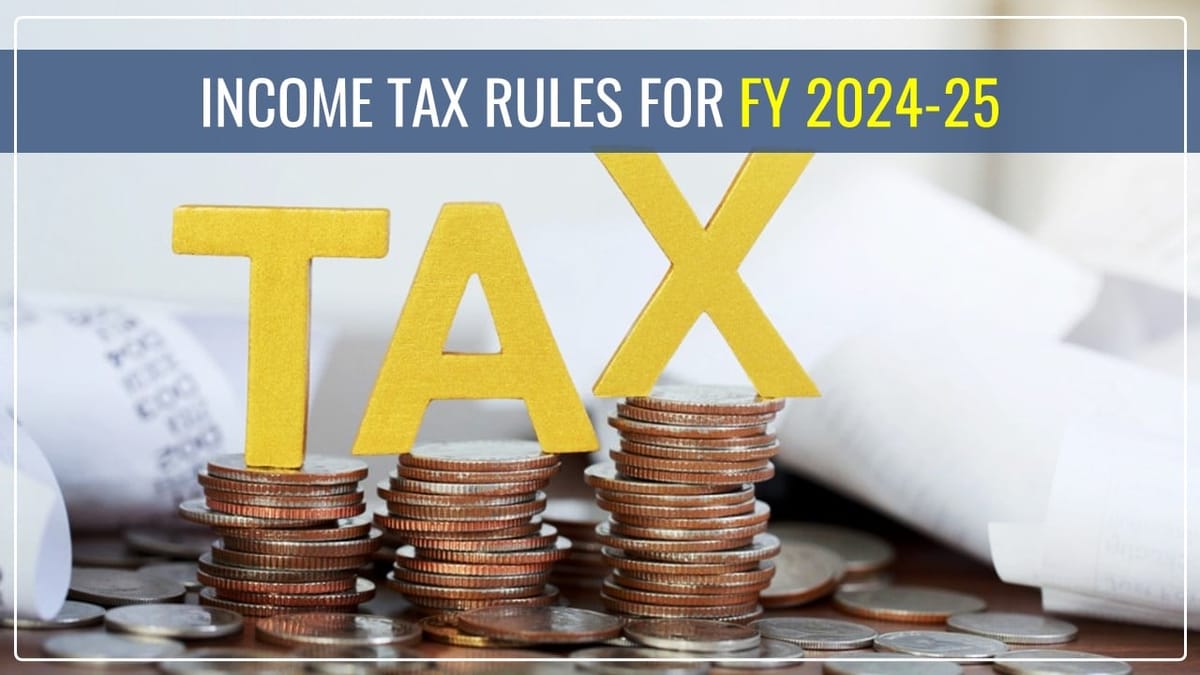As the Assessment year 2024-25 began on April 1, it is essential to be informed of income tax rules.
Reetu | Apr 3, 2024 |

Income Tax Rules for Salaried Persons in New Vs Old Tax Regime for AY 2024-25
As the financial year 2024-25 began on April 1, it is essential to be informed of income tax rules. Even if changes are announced in the Union Budget or during the year, they typically take effect at the beginning of the new financial year. This year, no changes were indicated for FY 2024-25 in the interim budget, so the previous year’s income tax rules remain unaltered.
Here are the Income tax rules that will apply from 1st April 2024:
According to the report, employees must choose between the old and new tax regimes when it comes to TDS (tax deducted at source) on salaries. The new tax regime serves as the default option. If you do not advise your employer that you are choosing the old tax regime, they will deduct tax based on the new regime from your salary. When your employer requests it, complete this task as soon as possible.
The old and new tax regimes differ in terms of the basic exemption limit. Individuals who earn less than this amount in a given financial year are not required to pay taxes. Currently, under the current tax regime, income up to Rs 3 lakh is tax-free for all individuals, regardless of age. In the old tax regime, the exemption limit varied with age. Individuals under the age of 60 are exempt from paying income tax on Rs 2.5 lakh, seniors between 60 to 80 years it’s Rs 3 lakh, and super senior people aged 80 and above, it’s Rs 5 lakh.
Both tax regimes offer deductions and exemptions, although the old regime has more. Examples of deductions and exemptions available under the previous tax regime include the basic deduction, Section 80C for investments and expenses up to Rs 1.5 lakh, Section 80D for health insurance premiums, and Section 80CCD (1B) for additional NPS deposits up to Rs 50,000. Deductions can also be claimed for house loan interest up to Rs 2 lakh, education loan interest, and charitable contributions. Individuals can also seek exemptions from house rent allowance (HRA) and leave travel allowance (LTA).
Individuals can only claim two deductions under the new tax regime. These include a standard deduction of Rs 50,000 from salary and pension income, as well as a deduction under Section 80CCD (2) for the employer’s NPS contribution. Under the new tax regime, family pensioners can also claim a standard deduction of Rs 15,000. It’s worth remembering that these deductions were also available during the old tax regime.
Individuals can reduce their net taxable income and tax liability by claiming allowable deductions, depending on the tax regime they choose.
Income tax laws provide a tax rebate to resident individuals in both tax regimes. This rebate, provided under Section 87A, eliminates the requirement to pay taxes if the net taxable income falls below a particular threshold.
The new tax regime provides a higger rebate than the old one. Individuals can receive a rebate of up to Rs 25,000 under the new regime, resulting in tax-free income of up to Rs 7 lakh. In comparison, the old tax regime provided a rebate of up to Rs 12,500, making income of up to Rs 5 lakh tax-free.
If you intend to use the old tax regime while completing your income tax return this year, make sure to submit your ITR by the July 31 deadline. This is critical since the new tax regime is the default option, and income tax regulations only allow individuals to choose the old tax system if they file their ITR on time. If you file a belated ITR between August 1 and December 31, your tax liability will be computed entirely under the new tax regime.
High-income earners who choose the new tax regime will pay a reduced surcharge rate. The rate for incomes surpassing Rs 5 crore has been cut from 37% to 25% under the new tax regime. However, if the individual chooses the old tax regime, a 37% surcharge rate will apply.
In case of any Doubt regarding Membership you can mail us at [email protected]
Join Studycafe's WhatsApp Group or Telegram Channel for Latest Updates on Government Job, Sarkari Naukri, Private Jobs, Income Tax, GST, Companies Act, Judgements and CA, CS, ICWA, and MUCH MORE!"